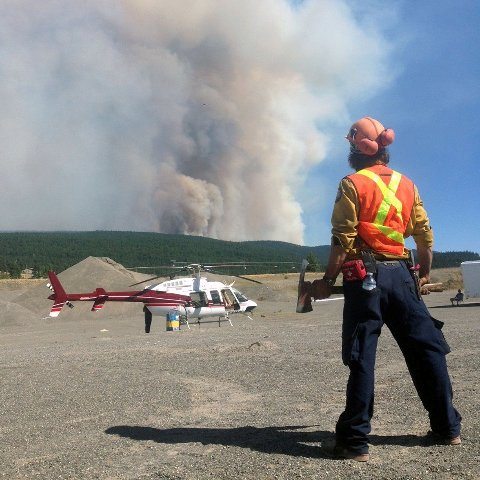The University of Northern BC is researching what is known about the health impacts of occupational exposure to wildfires that B.C. wildland firefighters and related personnel face on the job.
Dr. Chelsea Pelletier, an assistant professor at UNBC’s School of Health Sciences, is leading the project.
“I’m very excited to get started and to get it rolling,” Pelletier said. “I think it’s a very important topic to study. I don’t think you can live a summer in northern BC and not start to question the health impacts of all the wildfire smoke maybe with the exception of 2019. Wildland firefighters are our first responders and they do a lot for northern BC communities day in and day out throughout the summer, so I feel a little bit of a responsibility that we should spend time and really make sure that we understand the health risks that are associated with that.”
Pelletier said health sciences librarian Trina Fyfe and three graduate student trainees are assisting her with the project that has two phases. The first is a literature search to see what has been done and what is known on the health impacts of being a wildland firefighter, with the second phase to talk to or survey wildland firefighters, related personnel, and management at the BC Wildfire Service to determine what their research priorities are.
“We’re kind of conducting the preliminary literature search now and once we have that done and we have a feel what is in the literature and what we currently know, then we will send out and start talking to people about what is most important to them.”
Also conducting a study into wildland firefighter health is the University of Alberta.
The BC Wildfire Service (BCWS) is providing $305,000 to help fund the projects, and the province said the research that will help (BCWS) establish a long-term research strategy for worker health is expected to be completed in summer 2020.
“The overall goal of the work I would say is to understand what it is we should actually research next,” Pelletier said. “So in partnership with the BC Wildfire Service, we want to be able to give them a set of research priorities and a research plan for the next five years or so.”
Pelletier has conducted previous research looking at the respiratory health impacts from a single season of exposure with graduate student and former wildland firefighter Mike Eadie in 2017.
“He’s still in the process of analyzing and writing up that analysis right now.”
Something going on in the Cariboo you think people should know about?
Send us a news tip by emailing [email protected].








